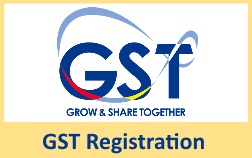From Beginning to End Up: The Ultimate Roadmap to GST Registration for Services Seeking Financial Security
Navigating the intricacies of Item and Services Tax Obligation (GST) enrollment is an important step for businesses pursuing monetary security. From recognizing the basic principles of GST to abiding by post-registration guidelines, the procedure can seem intimidating in the beginning glimpse. Nevertheless, damaging down the roadmap right into manageable actions can improve the enrollment journey for services aiming to improve their financial standing. Let's check out the crucial components that comprise this utmost roadmap and uncover how each stage adds to laying a solid structure for monetary success.
Recognizing GST Essentials
Exploring the basic principles of Product and Solutions Tax Obligation (GST) is vital for gaining an extensive understanding of its implications on businesses and the economy. GST is a value-added tax obligation imposed on most items and services for domestic intake. It has actually changed multiple indirect tax obligations that existed in the pre-GST age, simplifying the tax obligation structure and boosting convenience of doing organization in India. Under the GST system, both services and products are taxed at a details price, which is established based upon their classification. Businesses are called for to sign up for GST if their yearly turnover exceeds the threshold limitation set by the federal government. Input Tax Obligation Credit (ITC) is a substantial feature of GST, permitting businesses to assert credit score for taxes paid on inputs, lowering the overall tax obligation concern. Recognizing the fundamentals of GST is critical for organizations to follow tax obligation policies, handle their funds effectively, and add to the country's economic growth by joining a transparent tax obligation system.
Eligibility Criteria for Registration
To register for GST, companies must satisfy certain eligibility requirements established by the federal government. The key qualification need is that any kind of company included in the supply of products or services with a yearly accumulation turn over over the threshold limitation set by the authorities should sign up for GST. As of the current regulations, the threshold restriction for GST enrollment is a yearly accumulation turnover of 40 lakhs for companies running within a state, other than for unique category states where the limitation is 20 lakhs. In addition, certain businesses are called for to register for GST irrespective of their turnover, such as interstate distributors, laid-back taxable individuals, and services accountable to pay tax obligation under the reverse charge system. It is essential for companies to thoroughly evaluate their turn over and deal types to establish their GST registration obligations accurately. Failing to register for GST when eligible can result in penalties and lawful repercussions, making it important for organizations to stick to the specified qualification criteria.
Papers Required for Registration
Having actually satisfied the eligibility standards for GST registration, companies need to now guarantee they have the requisite files in place to proceed with the enrollment procedure effectively. The files needed for GST registration usually consist of proof of company constitution, such as collaboration action, enrollment certification, or incorporation certification for different kinds of organizations. Additionally, organizations need to give files establishing the principal location of business, such as a rental contract or electrical energy expense.
Step-by-Step Enrollment Process
Beginning the GST enrollment procedure involves a collection of organized steps to ensure a certified and smooth enrollment for companies. The very first action is to visit the GST website and fill in the registration type with precise details of business entity. Following this, the candidate obtains a Short-term Referral Number (TRN) which is utilized to return to the application process if it's not completed in one go.
Next, all needed papers according to the list offered by the GST portal requirement to be published. These documents normally consist of evidence of organization enrollment, address and identification proofs of promoters, economic declarations, and organization entity's frying pan card.

Post-Registration Compliance Guidelines

Conclusion
Finally, organizations seeking monetary security must understand the basics of GST, meet qualification standards, collect essential documents, follow the detailed registration process, and abide by post-registration standards - Best GST registration services in Singapore. By adhering to these steps, organizations can make certain conformity with tax Continue regulations and keep monetary security in the lengthy run
Furthermore, particular companies are required to sign up for GST regardless of their turn over, such as interstate providers, informal taxed persons, and businesses accountable to pay tax under the reverse charge device.Having met the eligibility criteria for GST registration, companies have to currently guarantee they have the requisite files in place to continue with the registration process effectively. The files needed for GST registration usually include evidence of business constitution, such as collaboration deed, registration certification, or consolidation certificate for various types of organizations. Furthermore, businesses need to give files developing the principal location of organization, such as a click here to find out more rental agreement or electrical power costs.Commencing the GST enrollment procedure entails a collection of organized steps to guarantee a smooth and compliant enrollment for companies.